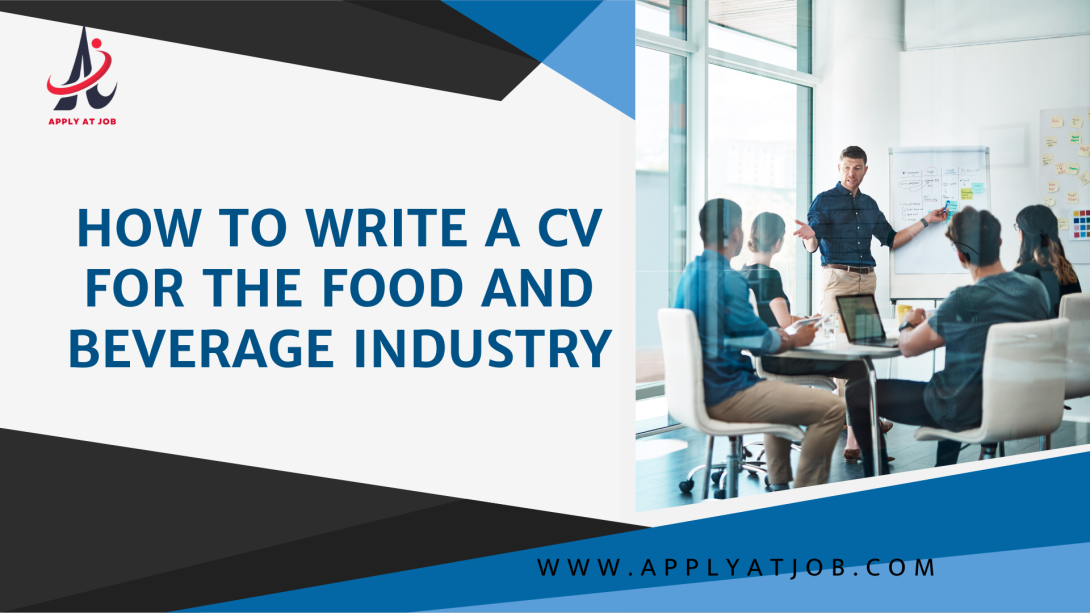
How to Craft a Resume for the Food and Drink Sector
One of the fastest-paced, most dynamic industries in the labor market is the food and beverage (F&B) sector. Every career, from management and culinary expertise to entry-level jobs, requires a different mix of abilities and traits. It's critical to write a CV that appeals to F&B hiring managers, who want applicants with real-world experience and a sincere love of hospitality. Here's how to create a CV that highlights your special talents in this cutthroat field while also making a statement.
1. Select the Appropriate CV Format
Choosing a format that fits your career level and objectives is the first step in writing a successful CV for the food and beverage sector.
. Reverse Chronological Format: Perfect for people who have worked in the field for a long time. Your employment history is highlighted in this way, beginning with your most recent role.
. Functional style: A functional style that prioritizes abilities over work history might be a wise decision for people with a variety of experience or those transitioning into the F&B industry.
. Combination style: This style combines chronological and functional elements, making it ideal for those who wish to highlight their strong talents and relevant expertise.
2. Begin with a Strong CV Synopsis
You have the opportunity to create a lasting impression with your CV summary. Consider it an elevator pitch that highlights your background, professional objectives, and strong points.
Example CV Summary: "7+ years of experience in the food and beverage industry as a dedicated and service-focused restaurant manager." shown ability to increase revenue by 15% through customer-focused initiatives and effective team management. competent in managing inventories, educating employees, and improving the visitor experience in hectic settings.
3. Emphasize Experience That Is Relevant
Customize each job entry you make to highlight accomplishments and abilities that meet F&B industry standards. Pay attention to:
. Job Title and Location: Make it clear where you worked and what your role was.
. Achievements Over Duties: Provide particular accomplishments (e.g., “Reduced food waste by 20% through revised inventory processes”) rather than merely a list of duties.
. Calculate Your Influence: Whenever feasible, illustrate your achievement with numerical data, like as increases in revenue, customer satisfaction ratings, or efficiency gains.
Example of Experience Entry:
Austin, Texas, Blue Plate Diner, Restaurant Supervisor | January 2018–Present
. 10% more tables were turned over each day thanks to effective teamwork.
. 15 servers were trained and managed, resulting in a 95% customer satisfaction rating.
. worked together with the kitchen crew to improve customer wait times by 15% by cutting down on food prep time.
4. Highlight Your Capabilities
A combination of technical and people abilities are valued in the food and beverage business. Recruiters can easily notice your relevant talents when your skills section is well-organized. If you have a variety of hard and soft abilities, divide them into several categories.
Section on Sample Skills
. Technical Skills: Point-of-sale (POS) systems, inventory management, menu planning, scheduling, and food safety and cleanliness.
. Soft Skills: Communication, problem-solving, teamwork, leadership, and customer service.
5. Certifications and Education
Adding any relevant degrees or certificates to your resume can help it stand out, even though many F&B jobs don't require formal schooling beyond high school. Certifications in food safety, mixology, or wine tasting are also beneficial, as are specialized courses like culinary school or hotel management.
Section on Education and Certification Example:
. 2015 Food Handler's Certificate ServSafe Certified Associate Degree in Hospitality Management, Chicago, IL, Expires 2025
. Wine and Spirits Certification Level 2 | 2019 Wine & Spirit Education Trust (WSET)
6. Showcase Achievements in Special Sections (Optional)
If you have notable achievements or experiences, such as awards, projects, or volunteer work in the F&B sector, consider including a “Achievements” or “Volunteer Work” section. This can add dimension to your CV and demonstrate your dedication to the industry.
Example
. Special Sections: Awards: “Employee of the Month” award for five consecutive months at The Blue Plate Diner.
. Volunteer Work: Organized and led a community cookout event, feeding over 200 people, showcasing commitment to local outreach and hospitality.
7. Check for Perfection using Proofreading
In the fast-paced food and beverage sector, accuracy is crucial, and your resume should demonstrate this. Verify that the information is current, the contact information is accurate, and the spelling and grammar are right. Think about having a mentor or friend look it over as well.
Synopsis:
A customer-focused restaurant manager who has demonstrated effectiveness in overseeing hectic dining settings. renowned for using effective operational techniques and staff training to improve visitor experiences and increase income. Seeking to provide experience to a fine dining establishment where patron pleasure is a top concern.
You can visit our site: Applyatjob.com
https://applyatjob.com/hiring-employee
https://applyatjob.com/jobs




